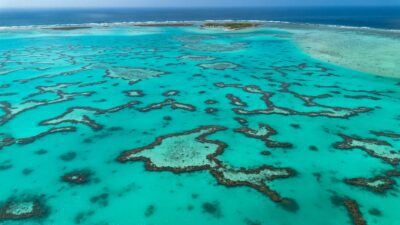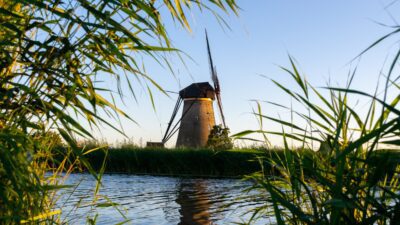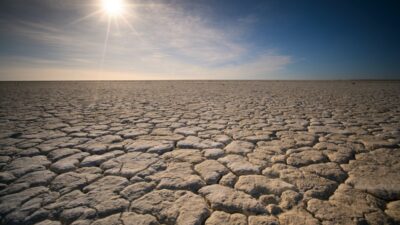Sydney Business Insights and Christopher WrightSydney Business Insights, Christopher Wright,
text

Coral or coal? Business divided
The Great Barrier Reef’s tourism industry is worth billions of dollars annually to Queensland and the Australian economy. But as economically impressive as it is, it’s not the only factor bringing money into the region. Mining and coal royalties are also major economic contributors. So what happens when the two main economic influencers directly oppose each other? What will this mean for the future of business in the region? We talk to Professor Christopher Wright to find out more.
Show notes
Putting out fire with gasoline
You can subscribe to our podcasts on iTunes, Spotify, Soundcloud, Stitcher, Libsyn, YouTube or wherever you get your podcasts. You can follow us online on Flipboard, Twitter, or sbi.sydney.edu.au.
Send us your news ideas to sbi@sydney.edu.au.
Sydney Business Insights is a University of Sydney Business School initiative aiming to provide the business community and public, including our students, alumni and partners with a deeper understanding of major issues and trends around the future of business.
Christopher Wright is Professor of Organisational Studies and leader of the Balanced Enterprise Research Network at the University of Sydney Business School. His research focuses on the diffusion of management knowledge, consultancy and organisational change.
Share
We believe in open and honest access to knowledge. We use a Creative Commons Attribution NoDerivatives licence for our articles and podcasts, so you can republish them for free, online or in print.
Transcript
Sandra Peter Introduction: The Great Barrier Reef's tourism industry is worth billions of dollars annually to Queensland and the Australian economy. But as comically impressive as it is it's not the only fact they're bringing money into the region. Mining and coal royalties are also major economic contributors. So what happens when the two main economic influencers directly oppose each other? What will this mean for the future of business in the region?
Introduction: From the University of Sydney Business School this is Sydney Business Insights, the podcast that explores the future of business.
Sandra: And today we are talking to Professor Christopher Wright about what happens when a region like Queensland needs to juggle two major economic influences. Christopher Wright is a professor of organisational studies at the University of Sydney Business School. And over the last 10 years he has been leading major research projects into how businesses respond to climate change. Welcome Chris and thank you for talking to us today.
Chris: Pleasure to be here.
Sandra: Can you set the scene for us.
Chris: Yeah sure. Well basically we've got two key sectors that are critical to Queensland into Australia. On the one hand we have tourism and related industries largely driven on the coast of Queensland by of course the Great Barrier Reef and on the other hand we have more established industry I guess around the extraction of coal fossil fuel for mostly export income and there are other industries involved in this tension particularly pastoral sector sugarcane agriculture local jobs et cetera. So there is a tension between essentially two key sectors in the Queensland economy the resources sector coal industry and tourism. And this has come to a head in a sense this tension around the future of the Great Barrier Reef because what we've seen in the last two years is a series unprecedented back to back bleaching of coral on the Great Barrier Reef and this has raised the issue of what might be causing this and whether resource extraction coal mining may be impinging on the likelihood of the reef maintaining its status as a major tourism drawcard.
Sandra: So we've seen almost 90 percent of the reef being affected almost twenty percent of the reef dying and we've also seen a major opportunity for the Queensland government to invest in a different industry. What's happened there?
Chris: Well essentially what's happened I draw most of my conclusions on the science that's been produced particularly people like Professor Terry Hughes from James Cook University has carried out many of the aerial surveys of the Great Barrier Reef. 2016 and 2017 we've had back to back coral bleaching events which have been caused largely or pretty well all of the way through warming of the ocean waters through climate change. So there's been unseasonably warm coastal waters and this has prompted these bleaching events of up to about two thirds of the Great Barrier Reef. Now if we include both bleaching events and Professor Hughes's research suggests the mortality rate from the bleaching events may be as high as 80 or 90 percent. So this is pretty catastrophic for the future of the reef which is one of the world's natural wonders which has existed for millions and millions of years and it now looks like through the impact of human activities globally in producing greenhouse gases and contributing to warming and climate change, we are now impinging on the future of the physical viability of the Great Barrier Reef. That then leads to the likelihood that large sections of the reef will probably die. Implications for tourism whether we're going to see reductions in number of people going to come to look at the reef that's dying. On the other hand there has been promotion from both sides of politics for the expansion of new coal mines particularly in the Galilee Basin of Queensland which is to the west of Mackay and if fully developed up to nine mega coal mines were developed. These would some of the biggest coal mines in the world and the first mine that's being proposed is being promoted by the Indian resources company Adani to open up the Adani Carmichael mine and it hasn't gone ahead yet it has ticked all the approvals and regulatory hurdles despite significant resistance and challenge and the company is now seeking about a billion dollar loan from the Federal government to construct a railway from the mine to the Abbot Point coal terminal to export coal.
Sandra: What are the economic and ethical challenges that the government and the state have to juggle?
Chris: Well economically State and Federal governments would be concerned about the royalties that might come from coal mining and coal export, the potential jobs that might be generated by this resource development. Ethically I guess on the coal side there might be some advantages in jobs for local communities but the problem there essentially is that although the company Adani initially promoted the possibility of tens of thousands of jobs under cross-examination in court in Queensland around the environmental approval it was found that in terms of direct jobs the Adani mine would only contribute around fourteen hundred and fifty direct jobs because it's going to be a highly automated mine. By comparison the tourism industry in Queensland on the coast there generates around 70,000 jobs so there is actually a significant jobs disequilibrium there in terms of coal not actually the coal industry not necessarily generating that many jobs. The other component there I guess is around climate change that if these coal resources are exploited and significant amounts of coal are exported to India as is the plan these will be some of the biggest coal mines in the world. They will generate significant greenhouse gas emissions when that coal was eventually combusted. And although there have been claims that the coal that's being mined is cleaner than other types of coal, the latest research suggests is actually high in ash and Sulphur it's not actually very clean coal at all and the whole concept of clean coal is something of a furphy because if you burn coal you're going to be emitting significant amounts of CO2. So those climate change effects will only be exacerbated by the exploitation of this coal reserve. And in fact if we take the carbon budget that the globe has to stay within to avoid dangerous climate change to avoid a two degree increase in global temperatures we actually need to leave around 90 percent of Australia's coal reserves in the ground that can't be exploited. And that means no new coal mines so the Adani Carmichael mine and associated mines that resource essentially cannot be exploited if we have any hope of winning dangerous climate change.
Sandra: One of the business cases that has been made for the coal that would come out of this mine has been for it to be shipped to India even though the Indian minister for energy has said that India aims to stop importing call by the end of the decade. Almost everywhere else internationally there seems to be a move away from coal. So who is the deal primarily supporting in this case and what is the time horizon that we're looking at.
Chris: Yes well that's quite right. The Indian Energy Minister Goyal has stated publicly several times now that India intends to close down its imports of foreign thermal coal. India itself is a significant miner of coal has significant coals domestically so there is no real need for it to be importing more high cost foreign coal irrespective its energy needs. The other dimension there is that Indian government is signaling significant move towards renewable technologies around solar energy in particular possibly wind. So there is real concern that the market for this coal is going to be mined from Queensland and may not exist. And so a number of financial analysts have argued that even if the moment to proceed it could represent a significant stranded asset given that the global market for seaborne thermal coal really isn't there. We're seeing a structural decline in demand for that coal. So the business case really probably doesn't hold up in the medium to long term and that could lead to a significant cost for local communities and Australia more generally in that we're loaning large amounts of money a billion dollars for this rail line. We could be left with coal mines open coal pits that have been developed but which failed to proceed. So there's the danger there of an economically stranded asset. So what's driving this agenda to push forward with the Galilee mines? I don't actually know a lot of the major financial institutions globally have stepped back from this proposal. They've refused to fund it. Standard Chartered in the UK many other large global banks and in Australia the big four banks are stepping back from any sort of commitments to finance this proposal. It's clearly got the support of the federal government and the State Labour Government I think largely because they fear the push back against them if they are seen as impeding any proposals for jobs that might come from local developments.
Sandra: Is there something that we could alternatively invest in that would be both economically beneficial but not environmentally detrimental?
Chris: Yes indeed I think it's pretty clear that if you're looking at an industry which ticks both the boxes of economic growth and jobs generation but it's also kinder to the environment, renewable energy sector would be the sector you would focus in on. It would require government leadership and policy initiative but you could fairly quickly I think ramp up large scale solar and wind energy developments. And if you think about the context of North East Queensland plenty possibilities there are around solar energy and wind energy and now with the innovation of battery storage that makes renewable energy a very viable proposition at scale for energy production for local communities up there but also jobs generation because a lot of these plants generate significant jobs in both the manufacturer and set up and the ongoing maintenance of their energy provision.
Sandra: Are there are other areas in the world where we've seen this tension between the environment as a source of income and industries that are competing for the same resources where the environment has triumphed without that from mental effects to the economy?
Chris: Well yes I mean this battle goes on across the world and usually unfortunately the environment is the loser. If you think about the big resource developments that are happening now in North America and Canada, there's the tar sands industry in the US massive expansion of gas fracking and oil exploration. So typically what happens is that energy mostly fossil fuel based energy trumps any sort of environmental concerns that might exist and this can lead to social protests as we saw in North Dakota last year in terms of an example where the environment perhaps comes out as a winner. I guess you could look at an example like Costa Rica and Central America where for a series of reasons that go back many decades government there decided that the environment should have a more pre-eminent position in discussions around economic development. And they have developed a quite innovative sort of approach to renewable energy where now the Costa Rican nation generates around 90 to 100 percent of its energy through purely renewable energy sources wind, solar, significant geothermal contribution given Costa Rica's location. But the other aspect there are other industries that promote eco-tourism so they get a lot of income by promoting the nature of their wilderness the forests the rainforests the exotic species. And that brings in income from tourists from all around the world who want to see a less spoiled environment and they want to see nature and exotic animals. So there's a country I suppose which is used the focus on energy which is the shift towards renewable energy and also leveraging the advantages that come from worldwide demand for sustainable eco-tourism.
Sandra: Where does all of this leave Australia with regard to the future of business in the area?
Chris: Well essentially we have a choice and we have a choice to pursue a more sustainable renewable future or we have a choice to keep moving down the path of business as usual which in Australia's case is essentially a nation driven by extractive industries by digging stuff out of the ground and opening up new larger fossil fuel based developments like the Adani coal mining Queensland which will lead to inevitably the demise of the Great Barrier Reef. So we have a choice and that choice needs to be delivered through political means. We need to force governments to make the right decisions towards a sustainable future and not to lock us into more fossil fuel developments which will essentially ensure our future will be a grim one indeed.
Sandra: Chris thank you so much for talking to us today.
Chris: My pleasure.
Outro: You've been listening to Sydney Business Insides, at the University of Sydney Business School podcast about the future of business. You can subscribe to our podcast on iTunes, SoundCloud or wherever you get your podcast and can visit us at sbi.sydney.edu.au and hear our entire podcast archive, read articles and watch video content that explore the future of business.
Close transcript







